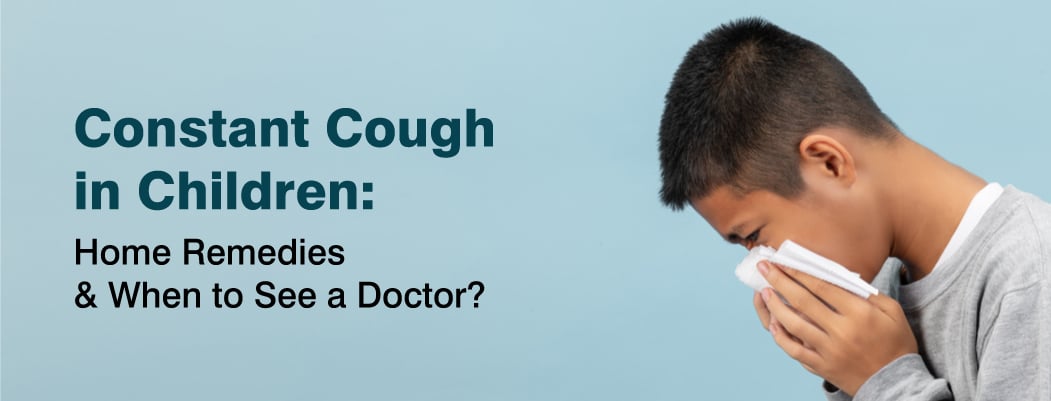How to Stop a Constant Cough in a Child
February 5, 2025

A constant cough refers to a cough that persists over an extended period without significant improvement or resolution. It is characterized by frequent coughing spells that occur throughout the day and may also continue during the night, disrupting sleep. Unlike occasional or temporary coughing associated with a common cold or respiratory infection, a constant cough typically lasts for several weeks or even longer.
Understanding the Causes
Before delving into the remedies, it’s crucial to identify the possible causes of a constant cough in children. Common triggers include respiratory infections (such as colds, flu, or bronchitis), allergies, asthma, postnasal drip, environmental irritants (like smoke or pollutants), and even acid reflux.
- Respiratory infections: Common cold, flu, bronchitis, or pneumonia.
- Allergies: Exposure to allergens like pollen, dust mites, pet dander, or mold.
- Asthma: Chronic inflammation of the airways leading to coughing episodes.
- Postnasal drip: Excess mucus dripping down the throat from the nasal passages.
- Environmental irritants: Smoke, air pollution, strong odors, or chemical fumes.
- GERD: Gastroesophageal reflux disease, where stomach acid flows back into the esophagus, causing coughing.
- Chronic conditions: Conditions like cystic fibrosis, bronchiectasis, or immune disorders can lead to persistent coughing.
Home Remedies to Stop a Constant Cough
- Hydration: Encourage your child to drink plenty of fluids like water, warm herbal teas, or diluted fruit juices. Staying hydrated helps thin the mucus in the airways, making it easier to expel and reducing the frequency of coughing.
- Honey: Honey is a natural cough suppressant and has antimicrobial properties. For children above the age of one, mix a teaspoon of honey with warm water or herbal tea. You can also add a dash of lemon juice. Give this mixture to your child before bedtime to soothe the cough.
- Steam Inhalation: Steam inhalation can provide immediate relief from a constant cough. Create a steam bath by running a hot shower and allowing your child to sit in the bathroom for about 10 minutes, taking deep breaths. Alternatively, you can use a humidifier in their bedroom to keep the air moist, easing coughing symptoms.
- Saline Nasal Drops: If your child’s cough is caused by postnasal drip or nasal congestion, saline nasal drops can help relieve the symptoms. Instill a few drops of saline solution in each nostril to clear the nasal passages. This will minimize the irritation that triggers coughing.
- Elevate the Head: Elevating your child’s head while sleeping can help reduce nighttime coughing. Use an extra pillow or elevate the head end of their bed slightly to promote better drainage of mucus and alleviate coughing.
- Warm Fluids: Warm fluids like soup or broth can provide soothing relief to a constant cough. They help to moisturize the throat and alleviate irritation. Opt for warm chicken soup or vegetable broth to provide additional nutrients and comfort.
- Gargling with Saltwater: For older children who can gargle, saltwater gargles can effectively reduce throat inflammation and relieve coughing. Mix half a teaspoon of salt in warm water and encourage your child to gargle with it for 30 seconds before spitting it out. This remedy should be supervised for younger children to prevent swallowing the solution.
- Rest and Sleep: Adequate rest and sleep are crucial for the body to heal. Ensure your child gets enough sleep to support their immune system and aid recovery. Avoid exposure to cold air or harsh environmental conditions that can worsen the cough.
When to Seek Medical Advice
While home remedies can often help alleviate a constant cough in children, it’s important to know when to consult a healthcare professional. You should seek medical advice under the following circumstances:
- Persistent Cough: If your child’s cough persists for more than a week despite trying home remedies and shows no signs of improvement.
- Severe Symptoms: If the cough is accompanied by high fever, severe chest pain, difficulty breathing, or wheezing.
- Underlying Health Conditions: If your child has a pre-existing respiratory condition such as asthma or if they have a weakened immune system due to other health conditions.
- Young Age: If your child is under the age of one, it is advisable to consult a healthcare professional for proper evaluation and guidance.
- Concerning Signs: If you notice any worrisome symptoms or signs that indicate a more serious condition, such as rapid breathing, bluish discoloration of lips or face, extreme fatigue, or dehydration.
Who to Consult
When seeking medical advice for your child’s constant cough, you can consider consulting the following healthcare professionals:
- Pediatrician: A pediatrician specializes in the health and well-being of children and can provide expert guidance and treatment options.
- Allergist: If you suspect that allergies might be contributing to your child’s cough, an allergist can conduct specific tests to identify triggers and provide appropriate treatment options.
- Pulmonologist: If the cough is persistent and related to a respiratory condition, a pulmonologist or lung specialist can provide further evaluation and specialized care.
Frequently Asked Questions
1. Does onion help with cough?
Yes, onions can help with a cough due to their antibacterial and antiviral properties. They help reduce mucus thickness and soothe irritation. You can use onions in several ways:
Onion juice: Mix with honey and drink twice daily.
Onion syrup: Heat chopped onions with honey, let it sit, strain, and take a few spoonfuls.
Onion broth: Drink warm onion broth for relief.
Onion vapors: Place a chopped onion in the room or under the bed to ease nighttime coughing.
Adding ingredients like lemon juice, garlic, or comfrey tea can enhance its benefits.







